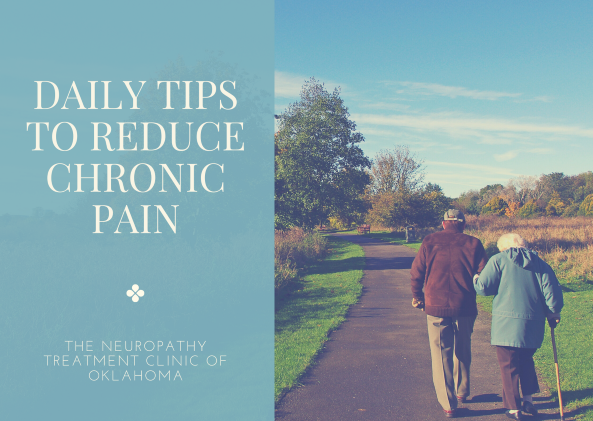In part one of this two-part blog series, we went over some general tips on reducing pain during your daily life. For the many individuals who struggle with chronic pain, some basic tactics may make a larger difference than you had thought in reducing symptoms and raising general comfort on a daily basis.
At Neuropathy Treatment Clinic of Oklahoma, we’re proud to offer numerous pain management services, from back and neck pain to knee pain, foot drop, and of course neuropathy itself. In today’s part two, we’ll go over a few other daily habits that play a significant role in helping reduce chronic and acute pain, including some mental areas that make a big difference.
Alternative Activities
One major area that we often speak to our patients about is the theme of participating in daily life rather than allowing pain to dictate your enjoyment. For many people, in fact, one of the best treatment methods for their daily pain is simply participating in alternative activities that get their mind off the pain and onto something else.
As for the kinds of activities possible here, your options are wide open depending on what you enjoy. If you like being mentally stimulated, consider taking a new class or learning a new game. If you enjoy light physical activity, try taking up a new activity or joining a local club. Don’t let pain control your life – take the initiative instead.
Scheduled Relaxation
Just like you schedule other parts of your life, schedule some down time each day to focus on yourself. This doesn’t need to be a long period – 15 to 30 minutes often does the trick, especially if you make this a true quiet time with no cell phones, televisions or other distractions. Reflect on the positive elements of the day and get your mindset in the right place before returning to the rigors of your normal schedule; you’d be surprised how much this helps the body deal with basic pain.
Pain Journal
A popular and effective method for pain management is the keeping of a pain journal, in which you document your pain level every day and note the triggers that may have increased it (or beneficial elements that helped it decrease). When you visit your pain management specialist, bring your journal and discuss it with them to help find the best possible tactics for pain reduction based on your needs.
Speak Up
Finally, your pain management specialist or doctor are not the only people who should know about your pain condition. If you have the kind of pain that makes certain tasks or parts of the day difficult, speak up about it to your friends or loved ones, informing them of any discomfort and areas where you need help. Being honest with those close to you allows you to symbiotically work out solutions that work for everyone.
For more on daily habits to assist with pain management, or to learn about any of our treatment programs, speak to the staff at Neuropathy Treatment Clinic of Oklahoma today.


